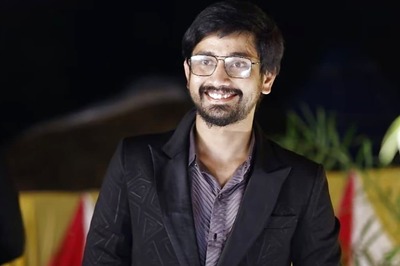
views
Amman: An Iraqi woman confessed on Jordanian television that she had tried to blow herself up alongside her husband in an Amman hotel last week in one of three attacks that killed more than 60 people.
The woman, identified by police as Sajida al-Rishawi, appeared on the television describing her attempts to detonate an explosives-laden belt at a wedding celebration in the Radisson hotel.
"We went into the hotel. My husband took a corner and I took another. There was a wedding in the hotel. There were women and children," Rishawi told state-run television.
"My husband executed the attack. I tried to detonate and it failed. People started running and I ran with them."
The television show included other pictures, which appeared to show Rishawi operating a mechanism covered in plastic and wearing explosives with a red wire strapped to her body.
Rishawi's husband and two other suicide bombers belonging to al-Qaeda killed themselves and 54 other people in three simultaneous attacks at the Hyatt, Radisson and Days Inn hotels.
It was not clear under what circumstances Rishawi gave her confession. She spoke with an Iraqi accent and said she came from the Iraqi city of Ramadi.
International human rights groups say Jordanian police extract confessions from detainees under duress.
Officials said that Rishawi is the sister of Samir Mubarak Atrous al-Rishawi, a dead former aide to Jordanian-born al-Qaeda in Iraq leader, Abu Musab al- Zarqawi. Al-Qaeda in Iraq claimed responsibility for the blasts.
Al-Qaeda in Iraq said in an Internet statement that a married couple and two other men, all Iraqis, had carried out the bombings at hotels frequented by Western security contractors who operate out of Iraq and by diplomats.
Most of those who died were Jordanians attending weddings.
Tighter laws
Jordanian Deputy Prime Minister Marwan al-Muasher told reporters all four bombers were from Iraq's western desert province of Anbar, a Sunni militant stronghold bordering Jordan.
PAGE_BREAK
Ramadi is the Capital of Anbar province.
He said that the attackers entered Jordan four days before the blasts, rented an apartment in a middle-class neighborhood in Amman and used suicide belts packed with 5-10 kg of explosives and ball-bearings to "inflict the most casualties."
Muasher named the three dead bombers as Safar Mohammed Ali, Rawad Jasim Mohammed Abid and Rishawi's husband as Ali Hussein al-Shimeri. He played down any Jordanian involvement.
"My husband organized everything," Rishawi said in the television appearance.
Hundreds of anti-riot police beefed up security at hotels and shopping malls across Amman. Interior Minister Awni Yarfas said the government would tighten anti-terrorist laws.
"We are speeding up passing an anti-terror law soon to indict anyone who supports terror either through advocacy and incitement either by word or action."
Jordan, a close US ally and one of two Arab nations to have peace treaties with Israel, had previously been spared al-Qaeda linked attacks that have hit other countries.
But authorities had warned that Zarqawi, who has a $25 million bounty on his head, had sent militants to strike targets outside Iraq, including Jordan.
Jordan is home to a large exiled Iraqi community, many of whom fled the war and its aftermath to settle in Jordan, creating a real estate boom that has boosted Jordan's aid-dependent economy.
It is also a hub for Iraq's reconstruction efforts.
But Amman's support for the 2003 US-led invasion of Iraq has angered some Jordanians, many of whom are of Palestinian origin and are against US policies in the region.
The blasts have sparked outrage in this small kingdom of about five million people.
thousand people held a candle-light vigil outside the Hyatt on Saturday and chanted support for the King.
US Secretary of State Condoleezza Rice, who is touring the Middle East and Asia, was expected to make a previously unscheduled stopover in Jordan on Monday.



















Comments
0 comment